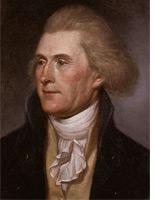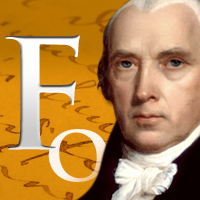Nope, Jefferson thought about Muslims in the US (along with Jews, Roman Catholics, etc.) He was willing to posit the franchise for Muslims who followed the laws, like any other citizen. (Although the percentage of voters out of the population was relatively small @ the time - maybe around 6% - because a certain amount of property - &/or money - & usually church membership - of the right kind - was also a requirement.)
See
Thomas Jefferson's Qur'an : Islam and the founders / Denise A. Spellberg, c2013, Alfred Knopf, 973.4609 SPEL 2013.
Subjects
Jefferson, Thomas, -- 1743-1826 -- Political and social views.
Jefferson, Thomas, -- 1743-1826 -- Religion.
Muslims -- Civil rights -- United States -- History -- 18th century.
Islam and politics -- United States.
Notes
Introduction : Thomas Jefferson's Qur'an : imagining the Muslim as citizen at the founding of the United States -- The European Christian origins of negative, incorrect, curious, but sometimes accurate American ideas about Islam and Muslims, 1529-1797 -- Positive European Christian precedents for the toleration of Muslims, and their presence in colonial America, 1554-1706 -- What Jefferson learned, and didn't, from his Qur'an : his negative views of Islam, and their political uses, contrasted with his support for Muslim civil rights, 1765-1786 -- Could a Muslim be president? : Muslim rights and the ratification of the Constitution, 1788 -- Jefferson "the infidel" wages war against an Islamic power; entertains the first Muslim ambassador in Washington; decides on where to place the Qur'an in his library; and affirms his support for Muslim rights, 1790-1823 -- Beyond toleration : John Leland, Baptist advocate for the rights of Muslims, 1776-1841 -- Afterword why can't a Muslim be president? : eighteenth-century ideals of the Muslim citizen and their significance in the twenty-first century.
Summary
"In this original and illuminating book, Denise A. Spellberg reveals a little-known but crucial dimension of the story of American religious freedom-- a drama in which Islam played a surprising role. In 1765, eleven years before composing the Declaration of Independence, Thomas Jefferson bought a Qur'an. This marked only the beginning of his lifelong interest in Islam, and he would go on to acquire numerous books on Middle Eastern languages, history, and travel, taking extensive notes on Islam as it relates to English common law. Jefferson sought to understand Islam notwithstanding his personal disdain for the faith, a sentiment prevalent among his Protestant contemporaries in England and America. But unlike most of them, by 1776 Jefferson could imagine Muslims as future citizens of his new country. Based on groundbreaking research, Spellberg compellingly recounts how a handful of the Founders, Jefferson foremost among them, drew upon Enlightenment ideas about the toleration of Muslims (then deemed the ultimate outsiders in Western society) to fashion out of what had been a purely speculative debate a practical foundation for governance in America. In this way,
Muslims, who were not even known to exist in the colonies, became the
imaginary outer limit for an unprecedented, uniquely American religious pluralism that would also encompass the actual despised minorities of Jews and Catholics. The rancorous public dispute concerning the inclusion of Muslims, for which principle Jefferson's political foes would vilify him to the end of his life, thus became decisive in the Founders' ultimate judgment not to establish a Protestant nation, as they might well have done." -- From publisher's web site.
(My emphasis)


